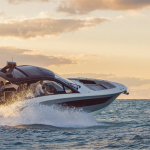Spira Footwear Sues USATF and IAAF
Spira Footwear said it has filed a lawsuit in U.S. Federal District Court against the International Amateur Athletic Federation (IAAF) and the United States Association of Track and Field (USATF), the rule making bodies for Track and Field both internationally and domestically. The lawsuit alleges that application of IAAF and USATF Rule 143 which purportedly bans spring technology for competition constitutes a violation of the Sherman Anti Trust Act and a restraint of trade.
Spira owns the patent rights to the WaveSpring(TM) technology in footwear. Spira alleges that the USATF rules prohibiting spring technology has effectively prohibited its ability to gain market acceptance of its technology as most elite runners will not compete in Spira products for fear of disqualification or sanction by the USATF. The USATF governs all competitive track and filed events and road racing in the U.S. including the Olympic Trials.
The IAAF rule, as amended in December, 2005, requires that shoes for competition be submitted for approval to the IAAF's technical committee. Spira alleges it followed the IAAF guidelines by submitting its shoes for approval in September, 2006. Despite repeated requests for a determination of its legality, Spira has yet to be provided with a response.
A press conference has been scheduled for Friday, April 13, 2007, 12:30 p.m. at the Jurys Hotel, 350 Stuart Street, in Boston with Foot Solutions team and coach Sue Bozgoz, Runners World's seven-time Runner-of-the-Year Tatyana Pozdnyakova, Coach of the Greater Boston Track Club Tom Derderian, Spira CEO Andy Krafsur and attorney Roy Brandys of Ray, Valdez, McChristian, who filed the lawsuit, in attendance.
Spira has long been at odds with USATF. In 2006, in order to bring attention to unfairness of the Rule, Spira launched its “Banned in Boston” campaign, offering $1 million to any runner who wins the Boston Marathon in the “Banned” shoe and runs the risk of disqualification.
The few elite runners who have competed in the shoe, have done so with caution. Keith Pierce, a track coach from Krum, Texas, and a U.S. Olympic trials hopeful, competed in the shoe at the 2007 Cowtown Marathon in Fort Worth, Texas. He won the race by over 12 minutes.
According to a recent story in the El Paso, Inc., Pierce said he does not believe the shoe provided him with an unfair advantage and indicates he would not risk competing in the shoes in attempting to qualify for the Olympic Trials.
Pierce stated in the news story that he was aware of the USATF prohibition against the use of the shoes in competition. In fact, he acquired his first pair of the shoes at last year's Boston Marathon, where Spira was providing shoes to elite runners. “But Cowtown didn't have a ban on the shoe so I didn't do anything wrong,” he said. “I think the whole USATF ban is ridiculous. I like them because they are the lightest shoes I've ever trained in. Really, they aren't that different. I've run 5-K's and 15-K's in those shoes and my times have been no faster than in regular shoes.”
Krafsur indicates that the dispute over the legality of the shoes is hardly surprising. “When you look at the history of innovation, particularly in the sporting industry, it's not unusual to see revolutionary technology at odds with long established rules,” he said. “Consider the oversized composite tennis racquet or the oversized metal club head in golf. They were banned when they were first introduced as well simply because the rules of the day could not keep up with the pace of revolutionary change. These changes are good, not bad for the sport. How much more enjoyable are tennis and golf, and how may more people participate in the sport because of these innovations? The WaveSpring technology is no different.”
There is precedent for innovators seeking to use the court system to challenge rules of governing bodies on Anti-Trust grounds. In 1989, Ping and a number of professional golfers sued the United States Golf Association over the legality of the ban on its U-grooved club face. The lawsuit settled just prior to trial with the USGA agreeing to allow the technology for competition.
Several elite marathon runners with the Foot Solutions team, including Charles Nyakundi Nyamoki (PR-2:16), Belay Teka Kassa (PR-2:18), Tamrat Awalew (PR-2:12), Jared Nyamboki (PR-2:21), (1/2 marathon time-1:01) Birhanu Wukaw (PR-2:17), Joseph Sitienei (PR-2:11) (1/2 marathon time-1:01) Josphat Ongeri (PR-2:17), and Oleg Strijakov (PR-2:11) are planning to defy the ban and race in the Spira shoe.















